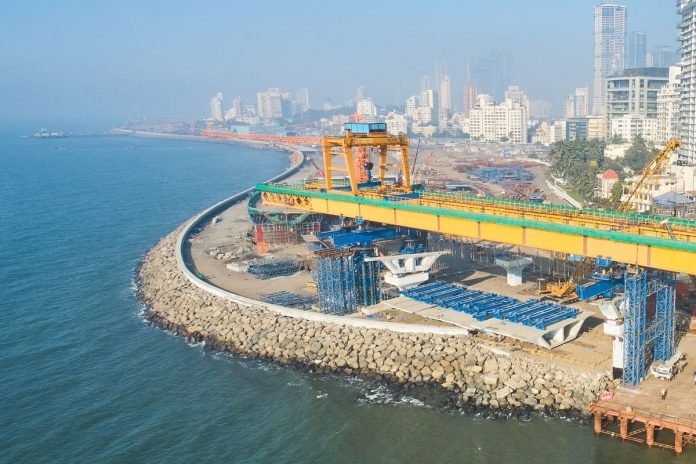The Mavala tunnel boring machine, which was used for digging of the 2.07 km-long twin tunnels beneath the Arabian Sea for the Mumbai Coastal Road Project (MCRP) has been dismantled.
“It took two months to dismantle the giant machine. The machine was lifted in five parts: cutter head, steel, and three gantries were separated,” said Mantayya Swami, chief engineer of MCRP.
Weighing over 2,800 tonnes, TBM Mavala, with a diameter of 12.19 metre, is the largest tunnel boring machine to ever be deployed in India.
Manufactured by China Railway Construction Heavy Industry Company Limited (CRCHIL), the TBM is now owned by Indian construction giant, Larsen and Toubro (L&T).
TBM Mavala tunneling for Mumbai Coastal Road project (@AshwiniBhide/Twitter)
While the Mumbai Coastal Road will be named after Chhatrapati Shivaji’s eldest son, the Maratha warrior king Chhatrapati Sambhaji Maharaj, the tunnel boring machine has been named after soldiers from his father’s army; every soldier of Shivaji’s army was called a Mavala.
Braving Through Challenges
It was in April 2020, when 70 containers with 184 consignments landed in in Mumbai’s Jawaharlal Nehru Port from Shanghai, carrying the many parts that would eventually form the ginormous Mavala.
As per the plan, experts from China were supposed to arrive in Mumbai to assemble the tunnel boring machine. But travel restrictions induced by the Covid-19 pandemic made it impossible.
Dismantled due to its massive size, Mavala was transferred to Priyadarshini Park via 17 different trucks, where it was assembled by the team of engineers from L&T and BMC in three months. The BMC, then, brough it to the launching site in a 200-wheel self-propelled transporter and freight wings.
TBM Mavala began its first tunnelling work in January 2021 from Priyadarshini Park at Nepean Sea Road and the first breakthrough was achieved on 11 January 2022 at the southern tip of the tunnel in Girgaon.
MCRP and BWSL connection
Following this, Mavala was pushed leftwards by using a hydraulic-jack powered turn-table which helped in rotating the TBM by 180 degrees, and in April 2022, excavation for the second tunnel began.
The breakthrough of the second underground tunnel took place on 30 May 2023 at Priyadarshini Park, the northern end of the tunnel, in the presence of Chief Minister Eknath Shinde and Deputy Chief Minister Devendra Fadnavis.
Breakthrough of final tunnel of MCRP
Earlier in August 2022, the TBM Mavala had created a history by excavating 456.72 metre length in a month – it broke the previous global record of 455.4 metre for monthly tunnelling done by a 13-metre single shield EPB (Earth Pressure Balance) TBM.
Notably, in February 2023, a rubber-bearing of the TBM malfunctioned, which stopped the project for a period of three months. Later, the bearing was replaced with a new one, which was imported from Italy.
What Next
The Project team started dismantling the TBM in June and completed it on 31 July. However, after digging more than 4 km (2 km each tunnel) through complex geological strata, Mavala’s next stop remains uncertain.
Quoting Swami, an Indian Express report said that once the dismantling is completed, a structural stability test of Mavala will be carried out, following which a decision on its future usage will be taken.
“The TBM have continuously mined through complex geological elements like breccia, basalt and shale. Mining underneath the Arabian Sea was also challenging. Therefore, there needs to be a check on the wear and tear of the parts of the machine,” said Swami to Indian Express.
“If the contractors feel that the TBM is fit for another new assignment, then they can deploy it there, and if they feel it needs to be replaced, then can sell it back to the manufacturer (CRCHIL) at a discounted rate, who may refurbish the product,” added Swami.
Some news reports have speculated that Mavala may be deployed for 3.8-km-twin tunnel road between Orange Gate and Marine Lines, as the height and width of the tunnels are required to be the same as the Coastal Road.
The Rs 6,000 crore project by the Mumbai Metropolitan Region Development Authority will provide connectivity between Orange Gate, Eastern Freeway to Marine Drive on Coastal road. Larsen & Toubro (L&T) has emerged as the lowest bidder for constructing the project at Rs 7,765 crore.


